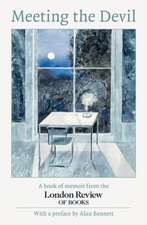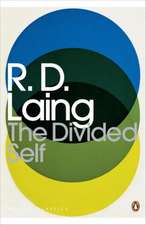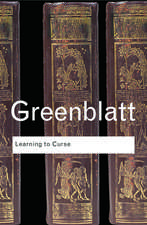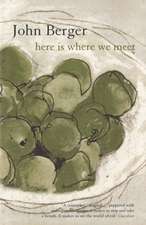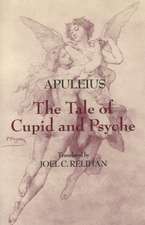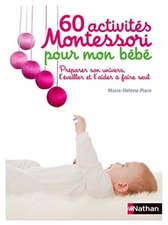Selected Essays of John Berger
Autor John Berger Editat de Geoff Dyeren Limba Engleză Paperback – 28 feb 2003
Berger’s insights make it impossible to look at a painting, watch a film, or even visit a zoo in quite the same way again. The vast range of subjects he addresses, the lean beauty of his prose, and the keenness of his anger against injustice move us to view the world with a new lens of awareness. Whether he is discussing the singleminded intensity of Picasso’s Guernica, the parallel violence and alienation in the art of Francis Bacon and Walt Disney, or the enigmatic silence of his own mother, what binds these pieces throughout is the depth and fury of Berger’s passion, challenging us to participate, to protest, and above all, to see.
Preț: 120.25 lei
Nou
Puncte Express: 180
Preț estimativ în valută:
23.01€ • 23.88$ • 19.23£
23.01€ • 23.88$ • 19.23£
Carte indisponibilă temporar
Doresc să fiu notificat când acest titlu va fi disponibil:
Se trimite...
Preluare comenzi: 021 569.72.76
Specificații
ISBN-13: 9780375713187
ISBN-10: 0375713182
Pagini: 608
Dimensiuni: 132 x 203 x 28 mm
Greutate: 0.45 kg
Editura: Vintage Publishing
ISBN-10: 0375713182
Pagini: 608
Dimensiuni: 132 x 203 x 28 mm
Greutate: 0.45 kg
Editura: Vintage Publishing
Notă biografică
John Berger was born in London in 1926. His many books, innovative in form and far-reaching in their historical and political insight, include the Booker Prize-wining novel G. His new collection of essays The Shape of a Pocket has been published in 2001. John Berger now lives and works in a small village in the French Alps.
Recenzii
"An important, not-to-be-missed chance to luxuriate in Berger's incomparable sagacity and visual sense." —The Washington Post
“[Berger’s grace] is in his way with words, and the infinite meanings he finds in that common but extraordinary thing, noticing.” —The New York Times Book Review
“Tenderness, and an unflagging interest in the experience of being human, infuse his work.” —Los Angeles Times
"Berger is one of the greatest living writers in the English language." —Buffalo News
“[Berger’s grace] is in his way with words, and the infinite meanings he finds in that common but extraordinary thing, noticing.” —The New York Times Book Review
“Tenderness, and an unflagging interest in the experience of being human, infuse his work.” —Los Angeles Times
"Berger is one of the greatest living writers in the English language." —Buffalo News
Cuprins
Editor's Introduction
From Permanent Red (1960) (US title Toward Reality)
Preface to the 1979 Edition
Introduction
Drawing
Jackson Pollock
Henry Moore
Juan Gris
Jacques Lipchitz
Ossip Zadkine
Fernand Léger
Pablo Picasso
Henri Matisse
Oskar Kokoschka
The Clarity of the Renaissance
The Calculations of Piero
Poussin's Order
Watteau as the Painter of His Time
The Honesty of Goya
The Dilemma of the Romantics
Millet and Labour
The Politics of Courbet
Gauguin’s Crime
From The Moment of Cubism (1969)
The Moment of Cubism
The Historical Function of the Museum
The Changing View of Man in the Portrait
Art and Property Now
Image of Imperialism
Nude in a Fur Coat: Rubens
The Painter in His Studio: Vermeer
Et in Arcadia Ego: Poussin
The Maja Dressed and The Maja Undressed: Goya
Mathias Grünewald
L. S. Lowry 138
Henri de Toulouse-Lautrec
Alberto Giacometti
Pierre Bonnard
Frans Hals
Auguste Rodin
From The Look of Things (1972)
Peter Peri
Zadkine
Le Corbusier
Victor Serge
Walter Benjamin
Drawings by Watteau
Fernand Léger
Thicker than Water (Corot)
Painting a Landscape
Understanding a Photograph
The Political Uses of Photo-Montage
The Sight of a Man
Revolutionary Undoing
Past Seen from a Possible Future
The Nature of Mass Demonstrations
The Booker Prize Speech
Speech on Accepting the Booker Prize for Fiction (1972)
From About Looking (1980)
Why Look at Animals?
The Suit and the Photograph
Photographs of Agony
Paul Strand
Uses of Photography
The Primitive and the Professional
Millet and the Peasant
Seker Ahmet and the Forest
La Tour and Humanism
Francis Bacon and Walt Disney
An Article of Faith
Between Two Colmars
Courbet and the Jura
Turner and the Barber’s Shop
Rouault and the Suburbs of Paris
Magritte and the Impossible
Romaine Lorquet
Field
From The White Bird (1985) (US title The Sense of Sight)
The White Bird
The Storyteller
The Eaters and the Eaten
On the Bosphorus
The Theatre of Indifference
Modigliani's Alphabet of Love
The Hals Mystery
In a Moscow Cemetery
Ernst Fischer: A Philosopher and Death
François, Georges and Amélie: A Requiem in Three Parts
Drawn to That Moment
The Eyes of Claude Monet
The Work of Art
Mayakovsky: His Language and His Death [with Anya Bostock]
The Hour of Poetry
Leopardi
The Production of the World
Ulysses
The First and Last Recipe: Ulysses (1991)
From Keeping a Rendezvous (1992)
Note to the Reader
Ev’ry Time We Say Goodbye
That Which Is Held
A Load of Shit
Mother
A Story for Aesop
The Ideal Palace
Imagine Paris
A Kind of Sharing
Christ of the Peasants
A Professional Secret
Ape Theatre
The Opposite of Naked
A Household
Drawing on Paper
Erogenous Zone
The Soul and the Operator
The Third Week of August, 1991
Appendices
Notes
Sources
From Permanent Red (1960) (US title Toward Reality)
Preface to the 1979 Edition
Introduction
Drawing
Jackson Pollock
Henry Moore
Juan Gris
Jacques Lipchitz
Ossip Zadkine
Fernand Léger
Pablo Picasso
Henri Matisse
Oskar Kokoschka
The Clarity of the Renaissance
The Calculations of Piero
Poussin's Order
Watteau as the Painter of His Time
The Honesty of Goya
The Dilemma of the Romantics
Millet and Labour
The Politics of Courbet
Gauguin’s Crime
From The Moment of Cubism (1969)
The Moment of Cubism
The Historical Function of the Museum
The Changing View of Man in the Portrait
Art and Property Now
Image of Imperialism
Nude in a Fur Coat: Rubens
The Painter in His Studio: Vermeer
Et in Arcadia Ego: Poussin
The Maja Dressed and The Maja Undressed: Goya
Mathias Grünewald
L. S. Lowry 138
Henri de Toulouse-Lautrec
Alberto Giacometti
Pierre Bonnard
Frans Hals
Auguste Rodin
From The Look of Things (1972)
Peter Peri
Zadkine
Le Corbusier
Victor Serge
Walter Benjamin
Drawings by Watteau
Fernand Léger
Thicker than Water (Corot)
Painting a Landscape
Understanding a Photograph
The Political Uses of Photo-Montage
The Sight of a Man
Revolutionary Undoing
Past Seen from a Possible Future
The Nature of Mass Demonstrations
The Booker Prize Speech
Speech on Accepting the Booker Prize for Fiction (1972)
From About Looking (1980)
Why Look at Animals?
The Suit and the Photograph
Photographs of Agony
Paul Strand
Uses of Photography
The Primitive and the Professional
Millet and the Peasant
Seker Ahmet and the Forest
La Tour and Humanism
Francis Bacon and Walt Disney
An Article of Faith
Between Two Colmars
Courbet and the Jura
Turner and the Barber’s Shop
Rouault and the Suburbs of Paris
Magritte and the Impossible
Romaine Lorquet
Field
From The White Bird (1985) (US title The Sense of Sight)
The White Bird
The Storyteller
The Eaters and the Eaten
On the Bosphorus
The Theatre of Indifference
Modigliani's Alphabet of Love
The Hals Mystery
In a Moscow Cemetery
Ernst Fischer: A Philosopher and Death
François, Georges and Amélie: A Requiem in Three Parts
Drawn to That Moment
The Eyes of Claude Monet
The Work of Art
Mayakovsky: His Language and His Death [with Anya Bostock]
The Hour of Poetry
Leopardi
The Production of the World
Ulysses
The First and Last Recipe: Ulysses (1991)
From Keeping a Rendezvous (1992)
Note to the Reader
Ev’ry Time We Say Goodbye
That Which Is Held
A Load of Shit
Mother
A Story for Aesop
The Ideal Palace
Imagine Paris
A Kind of Sharing
Christ of the Peasants
A Professional Secret
Ape Theatre
The Opposite of Naked
A Household
Drawing on Paper
Erogenous Zone
The Soul and the Operator
The Third Week of August, 1991
Appendices
Notes
Sources
Descriere
Once read, Berger's insights make it impossible to look at a painting, watch a film, or even make love quite the same way again. The range of subjects he addresses, the lean beauty of his prose, and the disarming simplicity of his opinions move the reader to view life, art, and the powers that bind with a new lens of awareness.
Caracteristici
With a superb introduction by Geoff Dyer that contextualises and unifies Berger's vast and varied writings over the years


